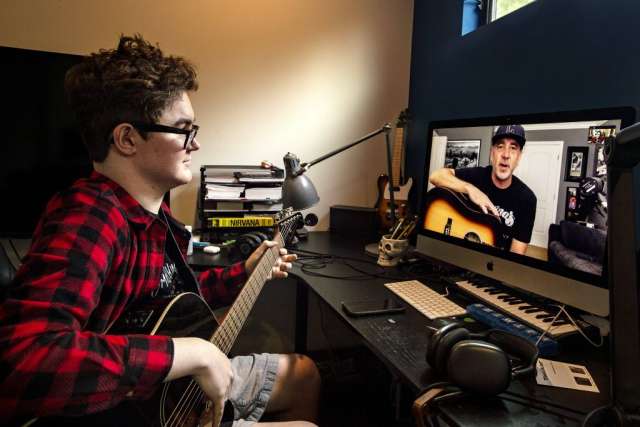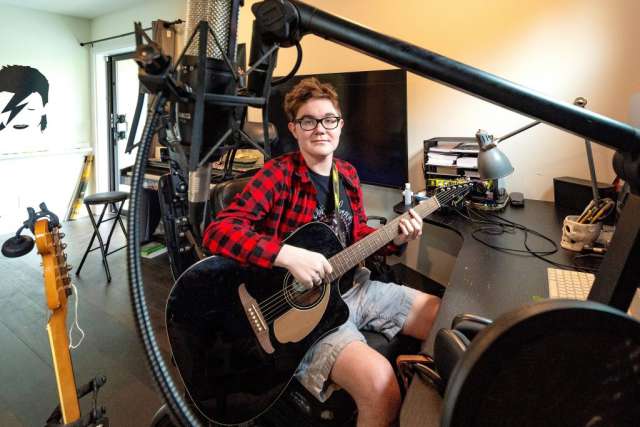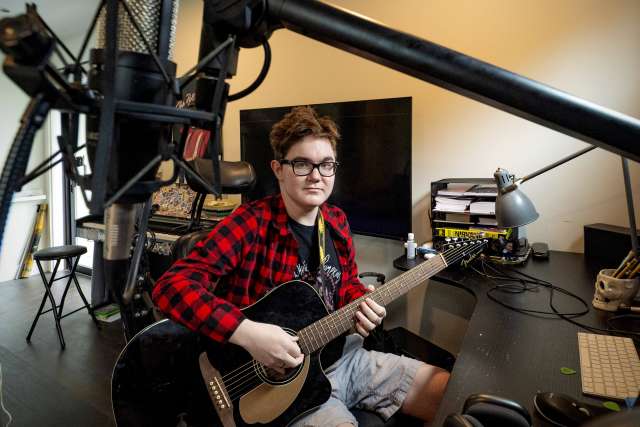Cooper Jones was no more than 6 and newly diagnosed with Duchenne Muscular Dystrophy, when punk rocker Jim Lindberg called him up on stage during a Pennywise show in Long Beach.
Lindberg, the band’s lead singer and a UCLA alumnus, wanted to promote Cooper’s Cure, an advocacy group started by Cooper’s parents, Scott and Cathy Jones.
“I went to a Pennywise concert and I went up on the stage to spread awareness and raise some money,” said Cooper, who is now 19. “Everyone was chanting my name.”
That would not be his last time in the limelight. Just as Lindberg pulled Cooper onto the stage, he would later push him to begin writing songs.

Cooper, who also sings and plays guitar, will be the musical frontman at a Cooper’s Cure benefit concert this summer. The event was postponed from May and now will be livestreamed July 10, with proceeds going to the Center for Duchenne Muscular Dystrophy at UCLA, where Cooper is a patient.
“It’s cool to show people even if you have Duchenne, you can still follow your dreams and you don’t have to be discouraged by that,” Cooper said. “I have the most fun doing this compared to anything I’ve ever done.”
Lindberg, a long-time family friend who helped start Pennywise in 1988, mentored Cooper through the process of writing and recording his own songs. He wonders if that long ago moment on stage helped inspire Cooper’s full-circle moment.
“I’m hoping that’s where he got it in his blood to try this type of thing,” Lindberg said. “No matter what age you are, it’s about finding what you’re passionate about in life. I really feel like that’s what he’s gotten out of his music.”
Early diagnosis
Cooper, a freshman at Cal State Long Beach, was diagnosed at age 4 1/2 with Duchenne, which appears in early childhood and is most common in boys. The genetic disorder, caused by a lack of the protein dystrophin that protects muscles from injury, leads to progressive muscular degeneration and weakness.
Life expectancy was once only into the teen years, but recent advances in cardiac and respiratory care have meant survival into the early 30s is more common, according to the Muscular Dystrophy Association.
Cathy Jones recalled that Cooper was slow to begin walking based on developmental milestones and fell a lot as a toddler. Eventually, a neurologist diagnosed him with Duchenne, which is the most common type of muscular dystrophy in children.
“I had no idea what Duchenne Muscular Dystrophy was. They had to say, ‘Jerry Lewis,’” Jones said, referring to the comic actor who for years hosted the annual Muscular Dystrophy Association Labor Day Telethon.
At 16, Cooper transitioned to a wheelchair full time. All along, his family focused on making each moment count.
“From Day 1, I just decided we’re going to focus on the things he can do,” Jones said. “From an early age, we just really got him into the arts. I also started him with guitar at not even 5.”
Then Jones met another Duchenne family whose son had loved jamming on his guitar but no longer had the strength to play. “After that I thought, ‘Why am I going to push him to do something that’s going to be stripped away from him?” she said.
Cooper, whose fingertips got sore from learning to play, didn’t mind stopping the lessons.
Yet years later, music came beckoning again.
Jones saw an older boy with Duchenne playing the keyboard, and although he struggled, he could do it. In middle school, she enrolled Cooper in piano lessons.
“Originally I didn’t want to play but my mom was the one really pushing me to do it,” Cooper said. “I really started to enjoy it.”
Next, Cooper decided to play the ukulele, then acoustic and electric guitar. He started voice lessons. By high school, he was playing guitar and singing solo covers at school events and parties.
Lindberg, who went to high school with Cooper’s dad, watched him perform “Hey There Delilah” and “Ring of Fire” at a café.
“I was just really bowled over by how talented he was, just a natural,” Lindberg said. “It’s really difficult to get up and play in front of people and have everyone looking at you. He just had nerves of steel from the get-go.”
A new challenge
In October 2019, the Jones family hosted a Cooper’s Cure fundraiser in their Redondo Beach backyard that raised nearly $30,000. Jones said they wanted to celebrate Cooper’s newfound passion for singing and playing guitar.
Cooper performed songs by David Bowie, Nirvana, the Beatles and Radiohead.

Lindberg also performed and delivered a message not in the lyrics.
“When I got up there and played, I challenged him when we came back next year to have his own song. I said it on the mic,” Lindberg said. “I’m hoping it was just the spark he needed to get going.”
After the fundraiser ended late that night, Jones went into her son’s room. “He’s literally sitting there writing, writing, writing,” she said.
Within a few months, the COVID-19 pandemic left Cooper home from his senior year of high school and Lindberg sidelined from international touring.
“In a matter of a few weeks, I found myself with a lot of time on my hands,” Lindberg said.
He and Cooper decided to meet weekly on Zoom for songwriting sessions.
Cooper already had the basic structure for his first song, “She’s Gone,” which was inspired by learning about serial killer Ted Bundy in his forensics class. He describes his musical style as alternative/punk.
“He helped me fill things out and finish my first song,” Cooper said. “It gave me the pressure to do it. I knew every week I was going to have the Zoom meeting with him. It motivated me to actually finish my songs.”
Lindberg said he was relieved to discover that Cooper’s talent extended to songwriting.
“I know plenty of people who are musicians, even professional musicians, who can’t write a song,” Lindberg said. “When I heard that first chord progress at the vocals, and the lyrics, I was like, ‘This kid has talent.’”
The two met from April to September, when Cooper went to the recording studio.
“We just got to work right away,” Lindberg said. “By the second meeting, he had the makings of the song ‘She’s Gone’ that he’s just released. After that, they just kind of kept coming.”
Cooper said Lindberg was helpful, supportive and positive in their sessions.
“I was really surprised at how humble he was,” Cooper said. “He’s pretty famous.”
The future
Cooper takes steroids, anti-inflammatories and cardiac medications to manage his condition. Over the years, he’s given his cells – to improve understanding of Duchenne – to UCLA translational research studies with Stanley Nelson, MD, and Carrie Miceli, PhD, the husband and wife co-directors of the Center for Duchenne Muscular Dystrophy at UCLA.
Drs. Nelson and Miceli have a son with Duchenne and have known Cooper since early after his diagnosis. They said they are pleased that Cooper’s therapies have slowed progression of the disease.
“It’s unusual that somebody who is 19 is able to play the guitar,” Dr. Nelson said. “He’s doing better than typical. It’s good to see him doing so comparatively well.”
Dr. Nelson said songwriting has been a confidence boost for his patient and he’s enjoyed watching Cooper perform.
“It’s catchy. It’s engaging,” he said. “It’s cool to see him producing and seeing how he’d like his music to be heard.”
Dr. Nelson said music allows Cooper to show others who he is, his abilities and that his disease and his wheelchair don’t define him.
“Those are great messages to give people,” Dr. Nelson said. “We’d love as many as possible to sign in to watch the fest in honor of Cooper and to help support the Center for Duchenne Muscular Dystrophy.”
While Duchenne is progressive, Cooper said he chooses not to dwell on what could happen. Cooper is hopeful that new genetic medicines emerging from research may preserve his muscle strength to allow him to continue playing.
Regardless, Cooper’s perseverance and positive attitude are his greatest strengths, Dr. Nelson and Miceli said.
“I don’t think there’s really a point to thinking about all the negative stuff,” Cooper said. “But I’ve always had in the back of my mind a little bit of dread and worry that I might not be able to do this forever.”
Cooper, who has three original songs on streaming services, said although he enjoys writing songs more than being on stage, it’s important to perform his own work.
“I feel like it’s more my song if I sing it,” he said. “I know there aren’t really too many in the arts, especially music, with Duchenne or who are disabled. It’s kind of cool – I’m like really one of the only people doing that right now.”
Details of the July 10 fundraiser will be posted to Cooper’s Cure. Cooper’s original songs can be heard on Apple music and Spotify.
Courtney Perkes is the author of this article.




